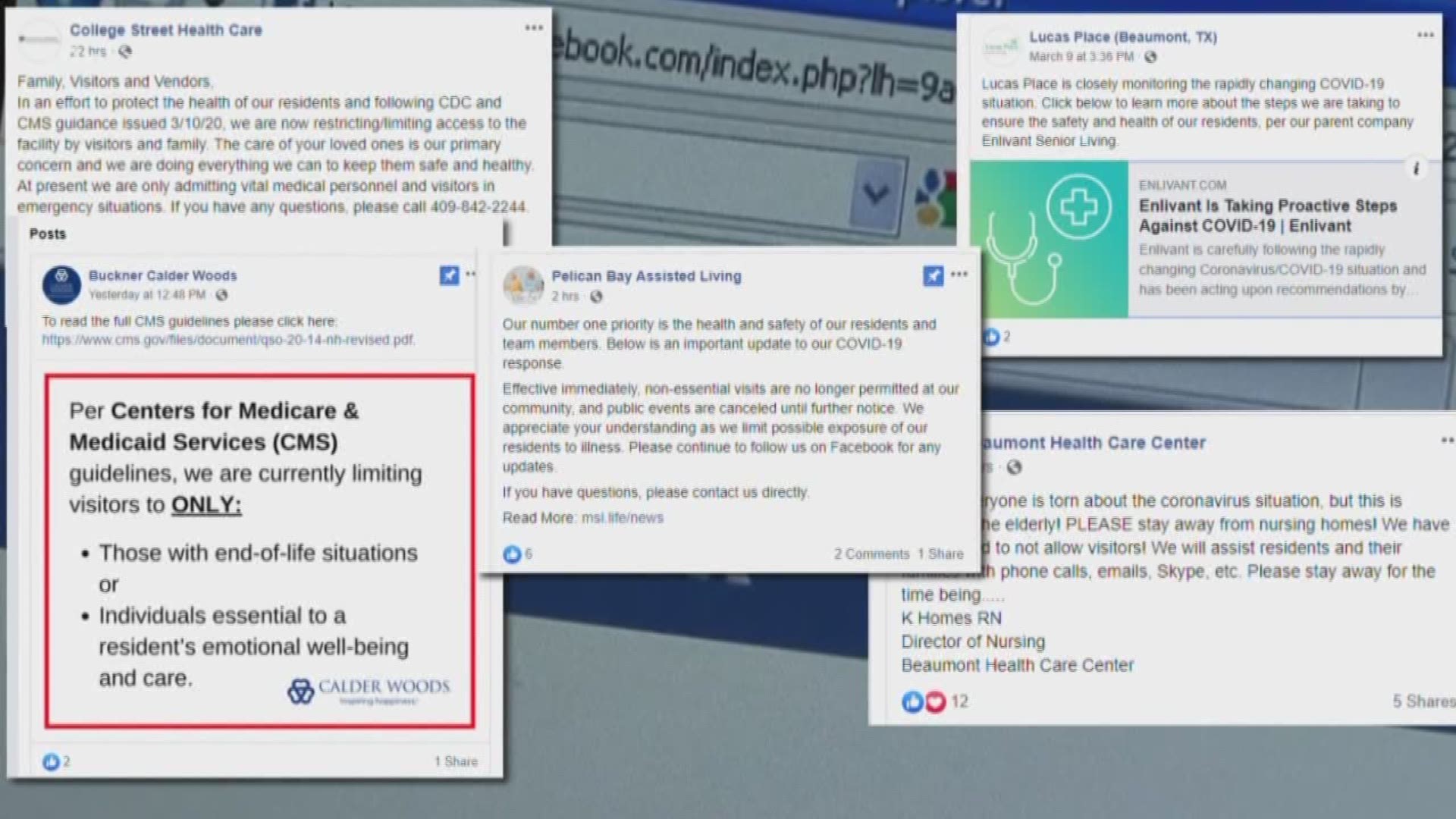BEAUMONT, Texas — Some nursing homes in Southeast Texas are beginning to limit visitors amid concern about the coronavirus.
Southeast Texas facilities like College Street Health Care, Lucas Place, Buckner Calder Woods, The Beaumont Health Care Center, and Pelican Bay all put out advisories saying they're limiting or restricting visits from family and friends.
According to the CDC people with serious chronic medical conditions and the elderly are at a higher risk of getting very sick from the coronavirus.
Dr. Sayed Anwar is the vice president for clinical operation for Steward Medical Group. He says most people won't exhibit many symptoms of the coronavirus, but the elderly and immunocompromised, it can be fatal.
Dr. Anwar advises staying away from nursing homes and assisted living facilities for the time being.
"We can show more love by just talking to them on the phone rather than visiting them, I think they need that and that will also help the nursing homes control the environment," Anwar said.
Anwar says there are exceptions to the rule. If a loved one is already at the end of their life, you won't jeopardize their life anymore by going to visit and say goodbye. As long as you take precautions like wearing latex gloves and masks and limiting interactions with other residents, you should be able to work something out.
Dr. Anwar says inside these facilities, the coronavirus can spread quickly. Much like the flu, he says if any nursing homes or assisted living see any of their residents start showing symptoms, they'll need to be quarantined.
Dr. Anwar says for those who are living independently, there is no need to isolate completely, as long as they take precautions. He suggests staying about three feet away from others and wearing gloves.
"I won't say isolate themselves but at least make smart decisions," he said, "I still want them to live independently, I don't want people to be worried about it too much."
Dr. Anwar expects the coronavirus to hit its peak in the next couple of weeks. For now he says keep washing your hands, keeping surfaces clean, and avoid large crowds, but don't panic. Anwar says some people are hitting an unnecessary level of hysteria. Like any other infection, he says it will come and go, and we'll be fine.
"Have a life don't go around hoarding up on stuff other people need those stuff too, I think in about less than 30 days all of these things will be fixed so enjoy life," Anwar said.
From the CDC - Things facilities should do now, before there are cases in their community or facility…
Educate Residents, Healthcare Personnel, and Visitors
- Share the latest information about COVID-2019.
- Review CDC’s Interim Infection Prevention and Control Recommendations for Patients with Confirmed Coronavirus Disease 2019 (COVID-19) or Persons Under Investigation for COVID-19 in Healthcare Settings.
- Educate and train HCP.
- Reinforce sick leave policies. Remind HCP not to report to work when ill.
- Reinforce adherence to infection prevention and control measures, including hand hygiene and selection and use of personal protective equipment (PPE). Have HCP demonstrate competency with putting on and removing PPE.
- Educate both facility-based and consultant personnel (e.g., wound care, podiatry, barber) and volunteers. Including consultants is important because they often provide care in multiple facilities and can be exposed to or serve as a source of pathogen transmission.
- Educate residents and families including:
- information about COVID-19
- actions the facility is taking to protect them and their loved ones, including visitor restrictions
- actions residents and families can take to protect themselves in the facility
Provide Supplies for Recommended Infection Prevention and Control Practices
- Hand hygiene supplies:
- Put alcohol-based hand sanitizer with 60–95% alcohol in every resident room (ideally both inside and outside of the room) and other resident care and common areas (e.g., outside dining hall, in therapy gym).
- Make sure that sinks are well-stocked with soap and paper towels for handwashing.
- Respiratory hygiene and cough etiquette:
- Make tissues and facemasks available for coughing people.
- Consider designating staff to steward those supplies and encourage appropriate use by residents, visitors, and staff.
- Make necessary Personal Protective Equipment (PPE) available in areas where resident care is provided. Put a trash can near the exit inside the resident room to make it easy for staff to discard PPE prior to exiting the room, or before providing care for another resident in the same room. Facilities should have supplies of:
- facemasks
- respirators (if available and the facility has a respiratory protection program with trained, medically cleared, and fit-tested HCP)
- gowns
- gloves
- eye protection (i.e., face shield or goggles).
- Environmental cleaning and disinfection:
- Make sure that EPA-registered, hospital-grade disinfectants are available to allow for frequent cleaning of high-touch surfaces and shared resident care equipment.
- Refer to List on the EPA website for EPA-registered disinfectants that have qualified under EPA’s emerging viral pathogens program for use against SARS-CoV-2.

